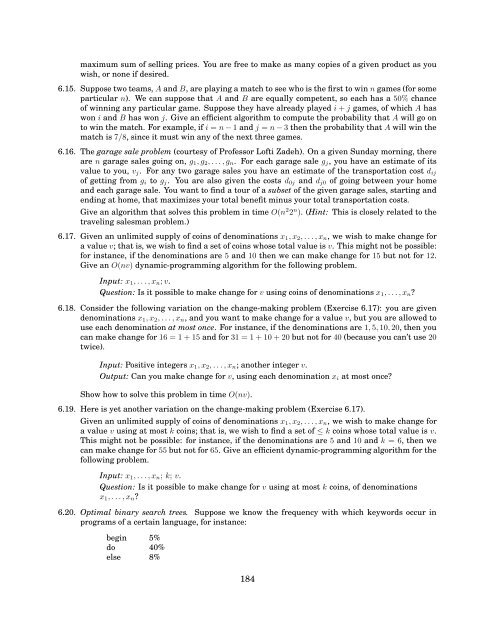Create successful ePaper yourself
Turn your PDF publications into a flip-book with our unique Google optimized e-Paper software.
maximum sum of selling prices. You are free to make as many copies of a given product as you<br />
wish, or none if desired.<br />
6.15. Suppose two teams, A and B, are playing a match to see who is the first to win n games (for some<br />
particular n). We can suppose that A and B are equally competent, so each has a 50% chance<br />
of winning any particular game. Suppose they have already played i + j games, of which A has<br />
won i and B has won j. Give an efficient algorithm to compute the probability that A will go on<br />
to win the match. For example, if i = n − 1 and j = n − 3 then the probability that A will win the<br />
match is 7/8, since it must win any of the next three games.<br />
6.16. The garage sale problem (courtesy of Professor Lofti Zadeh). On a given Sunday morning, there<br />
are n garage sales going on, g 1 , g 2 , . . . , g n . For each garage sale g j , you have an estimate of its<br />
value to you, v j . For any two garage sales you have an estimate of the transportation cost d ij<br />
of getting from g i to g j . You are also given the costs d 0j and d j0 of going between your home<br />
and each garage sale. You want to find a tour of a subset of the given garage sales, starting and<br />
ending at home, that maximizes your total benefit minus your total transportation costs.<br />
Give an algorithm that solves this problem in time O(n 2 2 n ). (Hint: This is closely related to the<br />
traveling salesman problem.)<br />
6.17. Given an unlimited supply of coins of denominations x 1 , x 2 , . . . , x n , we wish to make change for<br />
a value v; that is, we wish to find a set of coins whose total value is v. This might not be possible:<br />
for instance, if the denominations are 5 and 10 then we can make change for 15 but not for 12.<br />
Give an O(nv) dynamic-programming algorithm for the following problem.<br />
Input: x 1 , . . . , x n ; v.<br />
Question: Is it possible to make change for v using coins of denominations x 1 , . . . , x n ?<br />
6.18. Consider the following variation on the change-making problem (Exercise 6.17): you are given<br />
denominations x 1 , x 2 , . . . , x n , and you want to make change for a value v, but you are allowed to<br />
use each denomination at most once. For instance, if the denominations are 1, 5, 10, 20, then you<br />
can make change for 16 = 1 + 15 and for 31 = 1 + 10 + 20 but not for 40 (because you can’t use 20<br />
twice).<br />
Input: Positive integers x 1 , x 2 , . . . , x n ; another integer v.<br />
Output: Can you make change for v, using each denomination x i at most once?<br />
Show how to solve this problem in time O(nv).<br />
6.19. Here is yet another variation on the change-making problem (Exercise 6.17).<br />
Given an unlimited supply of coins of denominations x 1 , x 2 , . . . , x n , we wish to make change for<br />
a value v using at most k coins; that is, we wish to find a set of ≤ k coins whose total value is v.<br />
This might not be possible: for instance, if the denominations are 5 and 10 and k = 6, then we<br />
can make change for 55 but not for 65. Give an efficient dynamic-programming algorithm for the<br />
following problem.<br />
Input: x 1 , . . . , x n ; k; v.<br />
Question: Is it possible to make change for v using at most k coins, of denominations<br />
x 1 , . . . , x n ?<br />
6.20. Optimal binary search trees. Suppose we know the frequency with which keywords occur in<br />
programs of a certain language, for instance:<br />
begin 5%<br />
do 40%<br />
else 8%<br />
184


